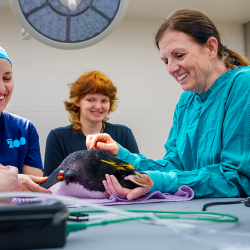Dr. Stephanie Morley is the president and chief medical officer for Zomedica, an animal health company based in Ann Arbor. Morley earned a bachelor’s degree in hospitality business from MSU in 1997 and a doctor of veterinary medicine degree from the MSU College of Veterinary Medicine in 2003.

What led you to your current career path?
I’m currently president and chief medical officer for Zomedica, an Ann Arbor-based animal health company focused on developing truly innovative diagnostics for veterinary medicine. Although the road to my current role was far from straight! I studied hospitality business at MSU with every intention of working in the ski industry in Colorado. But when the opportunities in front of me upon graduation weren’t what I was looking for, I decided to give myself one year working on the pre-requisites for vet school. Quite honestly, it was during a conversation on June 21, 1997 that I said, “Well, if I have to work for a living, working with animals could be pretty cool.”
My interest in business led me to a practice management externship with a corporate practice organization in Colorado during my third year, which led to a job in Albuquerque after graduation. You know what they say about the best laid plans? I ended up being the only vet in the hospital within a few months of graduation, relying on the amazing staff, some life-saving relief vets, and the Veterinary Information Network. The next move was back home to Kalamazoo, where I practiced small animal medicine and surgery in a fantastic hospital. It was the on-call work that led me to needing to leave practice and led me to lab animal medicine at a pre-clinical contract research organization. With my business background, I quickly moved into management roles with increasing levels of responsibility. I was ready to try something totally different and ended up in business development at the University of Michigan Medical School’s Fast Forward Medical Innovation Program. Yes, a Spartan veterinarian helping Wolverine physicians fund and commercialize their research and inventions!
When I was approached to start Zomedica, everything came full circle—the opportunity to apply my veterinary clinical experience, drug development knowledge, an operational management background, and translational innovation know-how into a business. After years of explaining how a hospitality business major ended up where I did in each phase of my career, it became very clear; I had to be exposed to all of these facets of the continuum of veterinary care to give back to the veterinary community, which I took an oath to, in a way that I was uniquely positioned to do so.
My goal with Zomedica is to bring technologies to veterinary medicine at the same time, or even before, they make it to human medicine. Healthy pets need healthy vets, and practicing the best-possible medicine is what my veterinary colleagues deserve.
What does it mean to you to encourage business and entrepreneurship among current students?
Labels and words can be so inhibiting to one’s willingness to try new things. “Business” and “entrepreneurship” are two words that students in life sciences don’t see as applying to them. They are actually offensive in some ways, like “sales” or “profits” can be. We went into our chosen profession for a love of animals and deep compassion to care for them. That doesn’t equate with sales and profits.
But it does. It’s important for students to understand how business works and how entrepreneurs think because that is what makes the world go ‘round! Every veterinarian I know is a salesperson, although usually a reluctant one! Your job is to get your recommended care for your patients by convincing an owner to pay for your recommendation. Whether that is a dog, a cat, a horse, or a large herd of cattle, you need to convince the person with the wallet to take your recommendation. If you’re in lab animal medicine or research, you are negotiating with principal investigators or grant institutions to make your case for the well-being of your patients or to fund your research. These are all sales events and largely pinned on effective interpersonal communications. And entrepreneurship is a difficult way to spell business founder. Business is the same thing, just different subjects and data points. You have a product (i.e. your clinical recommendation) to sell and exchange for value (i.e. your accounts receivable) and there is a cost to that good sold (i.e. everything and everyone in the hospital that you founded needed to provide care). And no one is successful in business, or anything in life, if you cannot effectively communicate value. YOU are the value.
What advice would you give to current veterinary students, or students interested in veterinary medicine as a career?
Veterinary medicine is about so much more than animals. Be prepared to deal with PEOPLE. But for any STEM student, I highly recommend you educate yourself on the basics of business in addition to your primary area of interest. Few in science are able to effectively articulate the business case for their value and few in business are able to understand the science. The more you open yourself to truly understanding and respecting both sides of that equation, the more valuable you will be to organizations in the future, and the more comfortable you will be with starting your own business.
How has your MSU veterinary education shaped your life?

I LOVED my time at MSU because it was the first time I remember being so engaged in learning. I had very little experience and was completely open to soaking in all I could. I think that set me up to do the same in every job I had (even if it didn’t feel like it at the time!).
What was the most interesting class you took and why?
Anatomy because it was the first lab I had in vet school and had the opportunity to get to know more of my classmates. I know I felt like an imposter, given I hadn’t grown up wanting to be a veterinarian, and getting to know those people and learning about how they got there and learning new things alongside them made me more comfortable.
What was the toughest class you took and why?
Equine was my first clinical rotation, and I’d never been alone with a horse. The first day at 5:00 a.m., I was in collecting blood by myself. It was tough because I thought they must be crazy to let me do this alone! By the end of the three weeks, that thought didn’t run through my head. I’ve had that same thought in EVERY job I’ve ever had, and I remember that experience as a way to say, “Come on, Stephanie, you’ve been here before” and I persevere.
What’s something you learned in vet school that you still use today?
EVERYTHING! I mean, there’s too much to list! I believe everything happens for a reason, so if you spend time connecting the dots, it’s easy to see you learned things that may seem irrelevant, but they aren’t.
Who was your favorite professor and why?
Dr. Susan Holcomb. She interviewed me during my application process, and I remember her intensity, but approachability. And then that came back to me in that first clinical rotation. I remember her saying at the end, “Could you have imagined three weeks ago you would have been able to do this by yourself?”
What are your hobbies or interests outside of veterinary medicine?
My husband and I have five children and one dog between the two of us, so raising our family definitely takes the bulk of my free time. However, I took up crocheting a few years ago and that has become such a creative release. We also like to ski, spend time on the lake, and we’re constantly finding home improvement projects. I’ve truly appreciated my need for a creative outlet in the past few years and I’m respecting it as often as possible
What’s your favorite way to celebrate being a Spartan?
I love to speak with students as often as MSU will use me. If I had someone tell me back then to not be afraid of failure or just going with my gut, I would have saved a lot of wasted time doubting myself!



